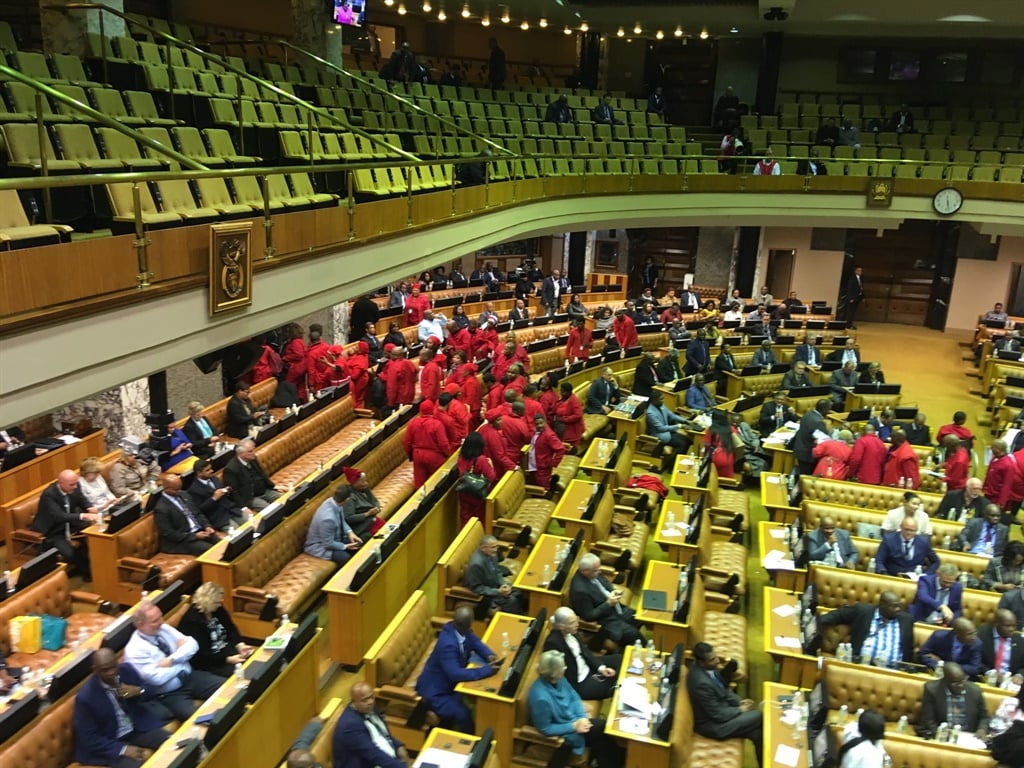
As with any institution, abiding by the rules should be a precondition of membership. Perhaps it is time to change the law so that once MPs have broken too many rules, too many times, they lose their seats, writes Melanie Verwoerd.
Last week the EFF were up to their old tricks in Parliament. Needing a new enemy, they turned on Pravin Gordhan.
When Gordhan wanted to speak in his budget vote some of the EFF members continuously interrupted him. When the chairperson ordered them to leave the chamber, first one and then a number of the MPs got up and walked up to the podium where Minister Gordhan was standing. They stood centimetres away from him until the parliamentary security eventually evicted them.
It was the most brazen act of bullying and intimidation I had ever seen, in or outside of Parliament. Interestingly it was the members of the opposition (including Natasha Mazzone), who first jumped up to protect Gordhan.
Afterwards Julius Malema triumphantly declared that "When Pravin appears in Parliament, we will repeat what we did before, and I will unashamedly be leading the #44Battalion from the front." He did not stop there. "He defends the white status quo, he is an infiltration in the struggle of the emancipation of our people. He was deployed to derail the liberation movement and when this was achieved, he remained to safeguard the interest of the white people."
This attack on Gordhan is so ridiculous that it is actually boring. The problem is that many young followers of Malema seem to believe in these outrageous and intellectually lazy utterances. Thus it is now fashionable to have placards at rallies with the words: "Gordhan, where were you during apartheid?"
For the record: Pravin Gordhan was an anti-apartheid activist from a very young age. Already as a young student at university he got into trouble for his beliefs and early in the 1980s was detained by the apartheid police. He spent much of his early 20s in detention. In 1981 he was held in solitary confinement for 160 days. According to friends close to him, he was severely tortured during this time. Gordhan went underground in 1986 before being arrested once more in 1990. He was released a year later to participate in negotiations which led to South Africa's democratisation.
Unlike the EFF members, I have worked with Pravin for many years post 1994. Like all of us, he has made his mistakes, but I can assure you that one of them has certainly not been to protect or defend white interests. To suggest that is truly laughable.
However, this is not a piece primarily about Pravin Gordhan or about the legal intricacies of the so-called rogue unit. What really concerns me, is what the EFF is doing to democracy and specifically to Parliament.
Like any institution Parliament has rules – as required by the Constitution – to ensure that this crucial institution can function properly and fairly. After the incident last week, I had another look at the rules. I counted at least 10 rules that the members of the EFF broke on the day.
For example: rule 69 states that members may not engage in grossly disorderly conduct in the House and its forums, including — (a) deliberately creating serious disorder or disruption; (b) in any manner whatsoever physically intervening, preventing, obstructing or hindering the removal of a member from the House who has been ordered to leave the House; (c) repeatedly undermining the authority of the presiding officer or repeatedly refusing to obey rulings of the presiding officer or repeatedly disrespecting and interrupting the presiding officer while the latter is addressing the House; (d) persisting in making serious allegations against a member without adequate substantiation or following the correct procedure; (e) using or threatening violence against a member or other person; or (f) acting in any other way to the serious detriment of the dignity, decorum or orderly procedure of the House.
Clearly, they were in breach of every section of rule 69. I believe a case can be made that they also broke rules 64, 66, 70, 84 and 85.
Parliament has to act immediately and decisively. This cannot continue.
The rules state that once someone has been removed from the House they are automatically suspended and may not come into the chamber or precinct of Parliament for the duration of the suspension. The first time this happens the suspension applies for five parliamentary working days, the second 10 days and thereafter 20 days per occasion. My understanding is that they also lose their salaries during these days.
The question is whether Parliament is actually applying this rule. After the incident with Gordhan last week one of the evicted EFF members was back in the chamber during another debate less than 30 minutes later.
If their salaries are deducted, one would think that MPs would be less eager to misbehave continuously. If indeed they don't care, then Parliament should change the rules and institute harsher penalties.
Surely, as with any institution, abiding by the rules should be a precondition of membership. So perhaps it is time to change the law so that once MPs have broken too many rules, too many times, they lose their seats and cannot come back.
I'm sure some people will say that would be going too far. However, when one of the most basic provisions of the Constitution, i.e. freedom of speech, is repeatedly denied to ministers or other members of Parliament, something has to be done to prevent total anarchy by a group of people who are misusing their parliamentary positions to intimidate and bully someone they simply don't like.
- Melanie Verwoerd is a former ANC MP and South African Ambassador to Ireland.
** Want to respond to the columnist? Send your letter or article to voices@news24.com with your name, profile picture, contact details and location. We encourage a diversity of voices and views in our readers' submissions and reserve the right not to publish any and all submissions received.
Disclaimer: News24 encourages freedom of speech and the expression of diverse views. The views of columnists published on News24 are therefore their own and do not necessarily represent the views of News24.




 Publications
Publications
 Partners
Partners























